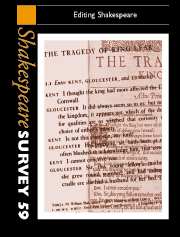Book contents
- Frontmatter
- Editing Shakespeare’s Plays in the Twentieth Century
- Crisis in Editing?
- On Being a General Editor
- Altering the Letter of Twelfth Night: ‘Some are born great’ and the Missing Signature
- ‘A Thousand Shylocks’: Orson Welles and The Merchant of Venice
- The Date and Authorship of Hand D’s Contribution to Sir Thomas More: Evidence from ‘Literature Online’
- Ferdinand’s Wife and Prospero’s Wise
- Editing Stefano’s Book
- Manuscript, Print and the Authentic Shakespeare: The Ireland Forgeries Again
- The Author, the Editor and the Translator: William Shakespeare, Alexander Chalmers and Sándor Petofi or the Nature of a Romantic Edition
- Women Edit Shakespeare
- The Shakespeare Edition in Industrial Capitalism
- Print and Electronic Editions Inspired by the New Variorum Hamlet Project
- The Evolution of Online Editing: Where Will it End?
- The Director as Shakespeare Editor
- The Editor as Translator
- Performance Editions, Editing and Editors
- Editing Collaborative Drama
- Will in the Universe: Shakespeare’s Sonnets, Plato’s Symposium, Alchemy and Renaissance Neoplatonism
- Giants and Enemies of God: The Relationship between Caliban and Prospero from the Perspective of Insular Literary Tradition
- Shakespeare’s Ages
- Who Wrote William Basse’s ‘Elegy on Shakespeare’?: Rediscovering a Poem Lost from the Donne Canon
- ‘Sometime a Paradox’: Shakespeare, Diderot and the Problem of Character
- Shakespeare Performances in England, 2005
- Professional Shakespeare Productions in the British Isles, January–December 2004
- The Year's Contributions to Shakespearian Study 1 Critical Studies
- 2 Shakespeare in Performance
- 3 Editions and Textual Studies
- Index
The Shakespeare Edition in Industrial Capitalism
Published online by Cambridge University Press: 28 March 2007
- Frontmatter
- Editing Shakespeare’s Plays in the Twentieth Century
- Crisis in Editing?
- On Being a General Editor
- Altering the Letter of Twelfth Night: ‘Some are born great’ and the Missing Signature
- ‘A Thousand Shylocks’: Orson Welles and The Merchant of Venice
- The Date and Authorship of Hand D’s Contribution to Sir Thomas More: Evidence from ‘Literature Online’
- Ferdinand’s Wife and Prospero’s Wise
- Editing Stefano’s Book
- Manuscript, Print and the Authentic Shakespeare: The Ireland Forgeries Again
- The Author, the Editor and the Translator: William Shakespeare, Alexander Chalmers and Sándor Petofi or the Nature of a Romantic Edition
- Women Edit Shakespeare
- The Shakespeare Edition in Industrial Capitalism
- Print and Electronic Editions Inspired by the New Variorum Hamlet Project
- The Evolution of Online Editing: Where Will it End?
- The Director as Shakespeare Editor
- The Editor as Translator
- Performance Editions, Editing and Editors
- Editing Collaborative Drama
- Will in the Universe: Shakespeare’s Sonnets, Plato’s Symposium, Alchemy and Renaissance Neoplatonism
- Giants and Enemies of God: The Relationship between Caliban and Prospero from the Perspective of Insular Literary Tradition
- Shakespeare’s Ages
- Who Wrote William Basse’s ‘Elegy on Shakespeare’?: Rediscovering a Poem Lost from the Donne Canon
- ‘Sometime a Paradox’: Shakespeare, Diderot and the Problem of Character
- Shakespeare Performances in England, 2005
- Professional Shakespeare Productions in the British Isles, January–December 2004
- The Year's Contributions to Shakespearian Study 1 Critical Studies
- 2 Shakespeare in Performance
- 3 Editions and Textual Studies
- Index
Summary
In 1924, E. K. Chambers delivered his British Academy Lecture, ‘The Disintegration of Shakespeare’, whose title neatly categorized a range of textual activities associated with the reattribution of Shakespeare’s plays to non-Shakespearian sources. Among these were the attribution studies of F. G. Fleay and J. M. Robertson, both of whom receive significant critical attention in the lecture. Robertson had been famously praised by T. S. Eliot in his earlier 1919 essay on Hamlet for ‘moving in the other direction’ of romantic idealization in favour of historical and intellectually rigorous scholarship. In what would become a remarkably sustained attempt to decode the authorship of Shakespeare’s lesser plays and passages through metrical and stylistic analysis, Robertson completed his five-volume analysis of the Shakespeare canon in 1930. Despite their claim to objective methodical analysis, Robertson and his contemporaries such as E. E. Stoll relied on preconceived ideals of Shakespeare’s literary quality and were, Chambers noted, as equally idealistic as the defenders of the canon. After 1924, despite Eliot’s praise, Robertson and his contemporaries would be better remembered as ‘disintegrating’ critics. This label is really rather remarkable, if only insofar as the idea of canonical disintegration entirely misrepresents such studies of attribution in a language antithetical to their (however misguided) pursuit, that is, identifying and characterizing the authentic Shakespeare text. More significant, though, is the rather morbid metaphoric dimension of Shakespeare’s disintegration.
- Type
- Chapter
- Information
- Shakespeare Survey , pp. 147 - 156Publisher: Cambridge University PressPrint publication year: 2006

